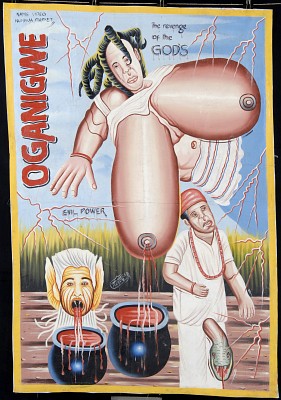
Exhibition poster by Bureau Mirko Borsche
Film posters from Ghana
Sammlung Staebler
Graphic design from West Africa: Ever since the 1980s, hand-painted posters have advertised Nollywood and locally-made action movies or family dramas in Ghana, not to mention the Hollywood blockbusters and martial arts films from the Far East. The drastic imagery with which the movie theaters and venues whet the potential audience's appetite tends to adapt local myths and religious dogmas from Christian Pentecostal believes alongside advertising elements from Hollywood and Hong Kong. In the posters as in the films, the occult and magic practices play a strong part, as does the antagonism of Good and Evil, the battle waged against the forces of darkness, giving rise, for example, to the noticeable preference for horror movies fueled by the fears of people who find themselves confronting the impenetrable, complex political and economic world of the present.
The posters thus go far beyond merely painting an appealingly exotic picture. These examples of African graphic design broaches issues of political correctness, of visual habits and visual traditions, of cultural origins and cultural transfer. The vibrant interaction between individual countries and continents in a globalized world hinges not only on goods, technologies and consumer habits, but also involves what were hitherto foreign aesthetic notions and concepts that can nevertheless emphatically change societies.
In sub-Saharan Africa, hand-painted advertising boards for hairdresser salons, take-aways, or native healers are still very much a normal part of street life. In Ghana, a special role is played in this colorful world of images by cinema posters; only in this West African country are there such individually designed 'one-offs", albeit creations that do not lay claim to being art in the Modern European sense.
When the first video recorders reached Ghana in the 1980s and gradually a rental structure arose for homegrown movies, in the urbane centers of Accra and Kumasi a host of simple movie theaters arose, usually called "video clubs". All they needed was a walled piece of ground and a TV, not to mentioned a VCR and chairs or benches. Mobile movie-theater operators moved around the country, creating overnight venues with a small electricity generator and simple equipment. Yet the progressive spread of private TVs have since almost put paid to these small cinemas.
To this day, hand-painted posters advertise the movie performances. The back of old flour sacks serve as the canvas, and the size of the sacks tends to define the format. The posters are made in small painting studios who act as service providers and make posters, advertising boards and other items, such as portraits or the likenesses of Rock stars, soccer players, and popular politicians.
Many of the representations are dramatically exaggerated and at times have little in common with the content of the films. Flashes of lightning and pots full of blood or magical potions allude to magical practices; rays from the eyes or mouth emphasize the figure's aggression. Then there are mythical figures such as the female demon Mami Wata in the guise of a mermaid or as a three-headed creature. Themes from international films are often simply incorporated as bits of the posters, sometimes simply adopted into the respective Ghanaian visual idiom.
The posters originate from the Dr. Wolfgang Staebler Collection, Rosenheim. An exhibition organized by Die Neue Sammlung - The International Design Museum Munich.























